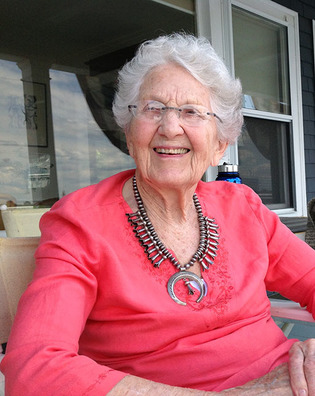 loading
loading
ObituariesIn Remembrance: Mildred McClellan Krebs ’49MusM Died on February 5 2019 View full imageMildred “Mimi” Nolte McClellan Krebs, an accomplished pianist and composer who studied under Paul Hindemith at Yale, died at home in Marblehead, Massachusetts, on February 5, 2019. She was 96 years old. Throughout her life, wherever she landed, Mimi made music. She was born Mildred Nolte in Duluth, Minnesota, in a household that was alive with music, poetry, and drama. During the Great Depression, growing up near Minneapolis, Mimi and her siblings would entertain the neighborhood with puppet shows and piano accompaniment. To create the effect of loud applause as the curtain fell, someone in the family would reach into a big bowl of marbles and swirl them around. “I liked Mimi’s extravagant ten-minute piano endings best,” said Jim Krebs, a childhood friend who married Mimi in 2006, when she was 83 years old and he was a “younger man” of 81. Mimi graduated from the University of Minnesota in 1941 with a bachelor’s degree in music, summa cum laude, and enlisted in the WAVES, the naval women’s reserve during World War II. She was commissioned an ensign and ordered to Houma Naval Air Station and blimp base, southwest of New Orleans, Louisiana. She and four other WAVES were issued .45 Colt revolvers and their own jeeps; their key assignment was decoding classified military messages from planes, ships, and blimps trying to keep Nazi U-boats out of the Gulf of Mexico. In her spare time, Mimi formed a swing band, Nolte’s Naughty Nine, that played nightly at the officers’ club. She wrote songs and improvised on the piano. After the war, now at lieutenant junior grade rank, Mimi used her GI Bill benefits to study music at Yale; Hindemith, the prolific German composer, was her professor. Mimi was awarded the Charles Dittson scholarship and later won Yale’s Horatio Parker Memorial Prize, which goes to the student who best fulfills the late Dean Parker’s lofty musical ideals. Mimi obtained a master’s of music degree from Yale in 1949 and taught music fundamentals at the U. of Minnesota and Vassar College for several years. In 1952, she married Sam McClellan, a Harvard-trained psychiatrist, and together they embarked on a 45-year love affair with the international Baha’i Faith, drawn by the core belief that all religions and peoples are one. From 1953 to 1973, the McClellans’ house in Cambridge, Massachusetts, was a beehive of activity for the Baha’is. Hundreds of people of diverse races, nationalities, and social classes, many of them university students, attended the couple’s Friday evening “firesides,” where they discussed Baha’i views on science and religion, racial discrimination, world government, and the equality of men and women. In Cambridge, when Mimi was not raising three children of her own or baking cookies for her “fireside” guests, she was writing music for the Baha’is, including eight musical dramas, three for children and five for adults. “She was a natural musician and she had an incredible grasp of language,” said Maggie McClellan, who sang in her mother’s musicals as a child. “With the fewest notes, she could create a beautiful melody that carried along the listener and was something to remember and to love.” The Education of Henry Halifax, a musical comedy about a young man who is learning the Baha’i laws from his girlfriend (what, no booze?), was performed before an audience of 3,000 at a national youth convention in Oklahoma City in 1973. It was Mimi’s best-known work; she wrote the lyrics, cast and rehearsed the production, and played the piano during the show, which got a standing, whistling, stomping ovation. “I never had more fun in my life,” Mimi told the crowd. In 1974, the McClellans moved to in Danville, Kentucky. During the next two decades, Mimi composed many works of classical modern music, some of which were performed by the faculty at Centre College. Mimi also produced two commissioned works while in Danville—a piece for chorus, organ, trumpet, and handbells for the installation ceremony of Michael Adams, the new Centre College president, in 1989; and “Three Pieces for Cello and Piano,” for the annual convention of Kentucky music teachers in 1990. That year, she won the Al Smith Individual Artist Fellowship for creativity in music composition, a $7,500 award. “Mimi’s work is not simple,” said Barbara Hall, a retired professor of music at the college. “But it is very appealing to audiences. It has colorful chords and dissonances, and enough unusual melody that it is never trite or clichéd. Sometimes, it is achingly beautiful.” Mimi was open, non-judgmental, and generous to all people, Hall said: “She was unmatched in friendship. She made friends with everyone she met, and she never lost a friend.” After Sam’s death in 1998, Mimi eventually moved east and married Jim Krebs, her old childhood playmate, who had been recently widowed. She immediately impressed her new family with her piano playing (Beethoven’s Moonlight Sonata and J. S. Bach’s Inventions); her extraordinary vocabulary (“Please butter the interstices of my English muffins”); her mischievous invitation to chat (“Sit on down and shut on up!”); and her boundless appreciation for “Jimmy’s” sly humor. “She was a world champion laugher,” Jim said. “I’d get her started and then after a while I’d inject another word and she’d keep on going. It was very gratifying.” In addition to Jim, Mimi is survived by her three children: John McClellan of Hatfield, Massachusetts, and Charlee and Maggie McClellan of Seattle, Washington, and two grandchildren, Elizabeth and Julia. A memorial will be held sometime in June. —Submitted by the family. |
|